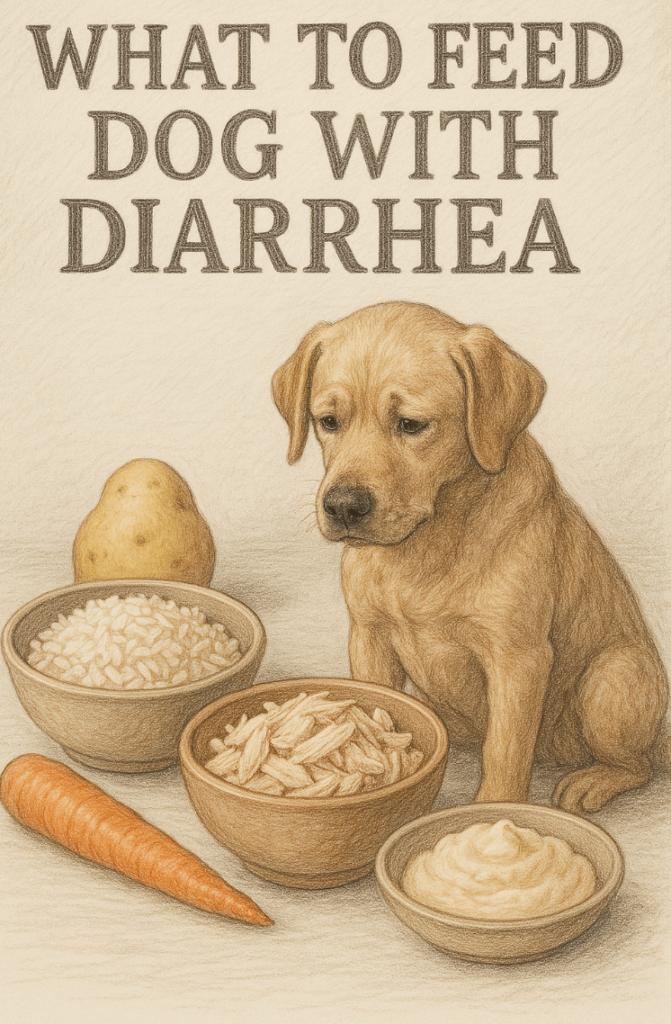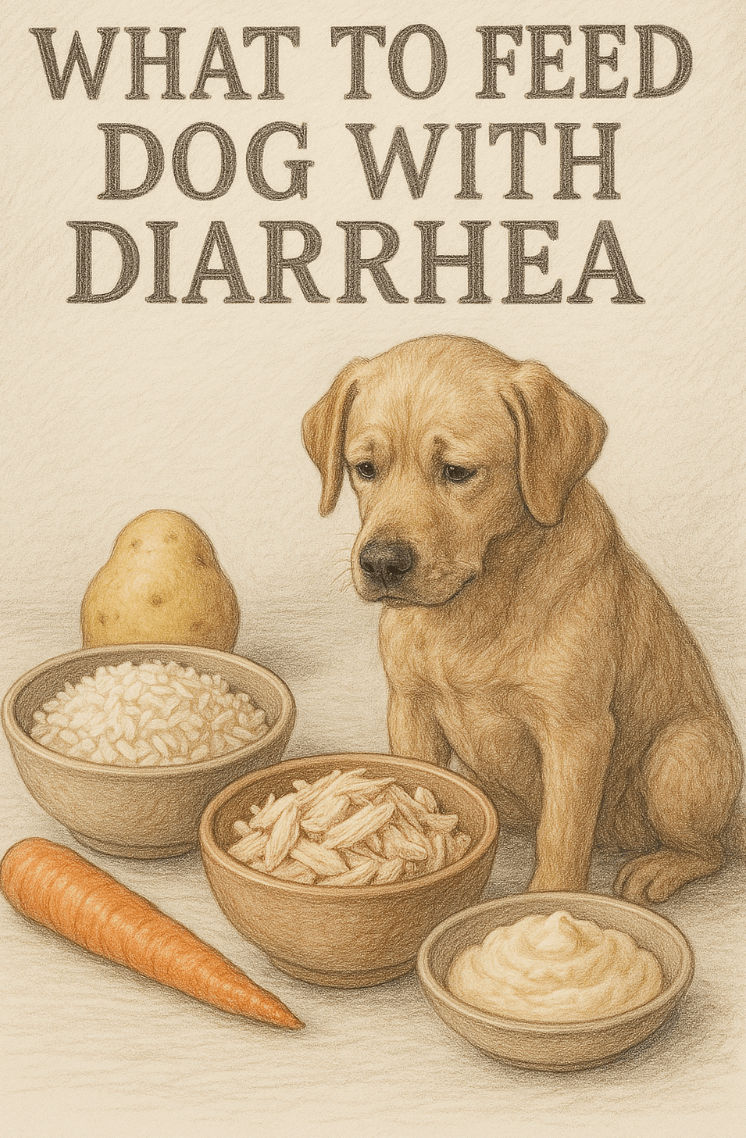What to Feed a Dog with Diarrhea: A Guide to Helping Your Furry Friend Feel Better
Diarrhea in dogs can be alarming for pet owners, but it’s often a temporary issue that can be managed at home with the right care and diet. Whether caused by dietary indiscretion, stress, or an underlying health condition, knowing what to feed your dog during this time is crucial for their recovery. While diarrhea is rarely serious, it can lead to dehydration and discomfort if not addressed promptly. In this blog post, we’ll explore safe and effective food options, tips for soothing your dog’s digestive system, and signs that indicate when it’s time to consult a veterinarian. With the right approach, you can help your pup bounce back quickly and comfortably.
Safe Foods to Feed a Dog with Diarrhea
When your dog has diarrhea, choosing bland, easily digestible foods is key to calming their upset stomach. These options are gentle on the digestive system and provide essential nutrients without overwhelming it.
Plain White Rice:
White rice is easy to digest and helps bind stool, making it a go-to choice for dogs with diarrhea.Boiled Chicken (Skinless and Boneless):
Lean protein like boiled chicken provides energy while being gentle on the stomach. Avoid seasoning or oils.Pumpkin (Canned or Fresh):
Pumpkin is rich in fiber and can help regulate bowel movements, whether your dog is experiencing diarrhea or constipation.Plain Yogurt (Unsweetened):
Probiotics in plain yogurt can restore healthy gut bacteria, aiding digestion and reducing symptoms of diarrhea.Sweet Potatoes (Boiled):
Sweet potatoes are packed with fiber and vitamins, making them a nutritious and soothing option for upset stomachs.
These foods are simple, affordable, and effective in helping your dog recover from diarrhea. Always introduce them gradually and monitor your dog’s response.
Foods to Avoid During Diarrhea Episodes
While some foods can soothe your dog’s digestive system, others can worsen their condition. Avoid these common culprits to ensure a speedy recovery.
Fatty or Greasy Foods:
High-fat foods like bacon or fried items are difficult to digest and can exacerbate diarrhea.Dairy Products (Other Than Plain Yogurt):
Many dogs are lactose intolerant, so milk, cheese, or ice cream can irritate their stomach further.Processed or Spicy Foods:
Chips, sauces, and spicy snacks contain additives that can upset your dog’s digestive tract.Raw Meat or Eggs:
Raw proteins may harbor harmful bacteria, increasing the risk of infection or worsening symptoms.Table Scraps or Human Snacks:
Feeding human food can introduce unfamiliar ingredients that may irritate your dog’s sensitive stomach.
Steering clear of these foods will prevent additional stress on your dog’s digestive system and promote faster healing.
Check this guide 👉Chronic Diarrhea in Dogs: Best 7 Expert Tips!
Check this guide 👉Yellow Brown Diarrhea in Dogs: Best 7 Expert Tips!
Check this guide 👉Antibiotics for Dog Diarrhea: Best 7 Health Tips!

Safe Foods for Dogs with Diarrhea | Foods to Avoid During Diarrhea |
|---|---|
Plain white rice | Fatty or greasy foods |
Boiled chicken | Dairy products (except plain yogurt) |
Canned or fresh pumpkin | Processed or spicy foods |
Plain yogurt | Raw meat or eggs |
Boiled sweet potatoes | Table scraps or human snacks |
Hydration Tips for Dogs with Diarrhea
Dehydration is a significant concern when your dog has diarrhea, as they lose fluids and electrolytes rapidly. Ensuring proper hydration is critical for their recovery.
Provide Fresh Water Constantly:
Keep clean water available at all times to encourage your dog to drink frequently.Offer Electrolyte Solutions:
Specialized dog electrolyte solutions can replenish lost minerals and prevent dehydration more effectively than water alone.Monitor Water Intake:
Track how much your dog is drinking—signs of dehydration include dry gums, lethargy, and sunken eyes.Freeze Broth Cubes:
Low-sodium chicken broth frozen into cubes can entice picky drinkers while providing hydration and flavor.Avoid Milk Substitutes:
Milk or sugary drinks can worsen diarrhea and should never replace water or electrolyte solutions.
Staying vigilant about hydration ensures your dog remains strong and comfortable throughout their recovery.
Signs That Your Dog Needs Veterinary Attention
While mild cases of diarrhea can often be managed at home, certain symptoms warrant immediate veterinary care. Recognizing these red flags ensures your dog receives timely treatment.
Blood or Mucus in Stool:
The presence of blood or excessive mucus indicates a potential infection or gastrointestinal issue that requires professional attention.Persistent Vomiting:
Vomiting alongside diarrhea can lead to severe dehydration and may signal an underlying problem.Lethargy or Weakness:
If your dog seems unusually tired, unresponsive, or unable to stand, they may be severely dehydrated or ill.Loss of Appetite:
Refusal to eat for more than 24 hours is a warning sign that something more serious could be wrong.Diarrhea Lasting More Than 48 Hours:
Prolonged diarrhea can lead to nutrient deficiencies and dehydration, necessitating medical intervention.
Seeking veterinary advice promptly can prevent complications and ensure your dog gets the care they need.
Preventing Future Episodes of Diarrhea
Prevention is always better than cure when it comes to your dog’s digestive health. These proactive steps can minimize the risk of recurring diarrhea.
Stick to a Consistent Diet:
Sudden changes in food can upset your dog’s stomach; transition slowly over 7-10 days if switching diets.Limit Access to Trash or Harmful Items:
Dogs are curious, and eating inappropriate items can lead to digestive issues. Secure trash cans and hazardous materials.Provide Regular Exercise:
Physical activity promotes healthy digestion and reduces stress, which can contribute to diarrhea.Schedule Routine Vet Checkups:
Regular examinations help catch underlying health conditions early before they manifest as digestive problems.Supplement with Probiotics:
Adding probiotics to your dog’s diet supports gut health and strengthens their immune system.
Taking these precautions can keep your dog’s digestive system happy and healthy in the long run.
Understanding Common Causes of Diarrhea in Dogs
Knowing the root causes of diarrhea can help you address the issue more effectively. Here are some common triggers to be aware of.
Dietary Indiscretion:
Eating garbage, spoiled food, or non-food items can irritate your dog’s stomach and lead to diarrhea.Food Allergies or Intolerances:
Certain ingredients like wheat, soy, or dairy may cause adverse reactions in sensitive dogs.Parasites:
Worms, giardia, and other parasites are frequent culprits behind gastrointestinal upset.Infections:
Bacterial or viral infections, such as parvovirus, can result in severe diarrhea and require immediate treatment.Medication Side Effects:
Some medications, including antibiotics, can disrupt gut flora and cause digestive issues.
Identifying the cause allows you to tailor your approach and seek appropriate care if needed.
Natural Remedies to Support Digestive Health
In addition to dietary adjustments, natural remedies can complement your efforts to soothe your dog’s upset stomach.
Slippery Elm Bark:
Known for its soothing properties, slippery elm can coat the digestive tract and reduce irritation.Ginger (in Small Amounts):
Ginger has anti-inflammatory properties that can ease nausea and aid digestion.Chamomile Tea:
A small amount of cooled chamomile tea can calm the stomach and reduce inflammation.Coconut Oil:
Rich in medium-chain triglycerides, coconut oil can support gut health and boost immunity.Activated Charcoal:
Available in capsule form, activated charcoal can absorb toxins and alleviate symptoms of mild diarrhea.
Always consult your vet before introducing new supplements or remedies to ensure safety and effectiveness.
Frequently Asked Questions About Feeding Dogs with Diarrhea
How long does diarrhea typically last in dogs?
Mild cases usually resolve within 24-48 hours, but persistent symptoms require veterinary attention.
Can I give my dog over-the-counter medications?
Never administer medications without consulting your vet, as some can harm dogs.
Is fasting recommended for dogs with diarrhea?
A short fast (12-24 hours) can allow the digestive system to rest, but always provide water.
Should I switch my dog’s regular diet after recovery?
Gradually reintroduce their normal food, and consider switching to a high-quality, easily digestible diet if issues persist.
Can stress cause diarrhea in dogs?
Yes, changes in routine, environment, or emotional distress can trigger digestive upset.
Supporting Your Dog Through Digestive Challenges
Diarrhea is an unpleasant experience for both you and your furry friend, but with the right care and feeding strategies, most dogs recover quickly. By offering bland, digestible foods, ensuring proper hydration, and monitoring for warning signs, you can help your dog feel better and regain their energy. Remember, prevention is key—maintaining a balanced diet, avoiding harmful foods, and minimizing stress can reduce the likelihood of future episodes. If you’re ever unsure, don’t hesitate to reach out to your veterinarian for guidance. Your dog depends on you, and with patience and love, you’ll have them wagging their tail again in no time.
Do Cats Have Taste Buds? Best 7 Expert Tips! – Discover how cats experience flavors and why their taste is so unique.
Do Dogs Have Taste Buds? Best 7 Expert Tips! – Discover how dogs experience taste, their preferences, and what it means for their diet and health.
Can Cats Taste Sweet? Best 7 Expert Tips! – Discover why cats can’t taste sweetness, how it affects their diet, and tips to keep them healthy and happy.
Can Dogs Taste Sweet? Best 7 Expert Tips! – Discover how dogs perceive sweetness, which foods are safe, and tips to manage their sweet cravings responsibly.





